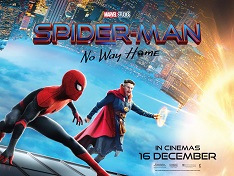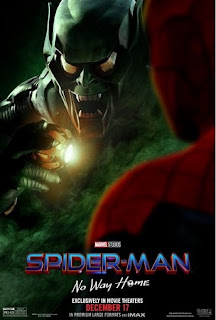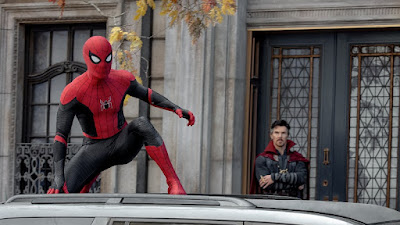As worldwide fans of the hit show know and love, the BBC show took the most famous fictional detective and his universe to the modern day and remains the best modern update of the classic Victorian stories and novels from the inimitable Arthur Conan Doyle.
The Abominable Bride is a tribute to the Sherlock Holmes Canon as much as it an attempt
by Mark Gatiss and Steven Moffat to finally take their show back to its original setting.
The episode begins with a quick recap of the first three seasons. Then we are presented with an alternate version that might have happened in the 19th century.
Similar to the opening scenes in S1E1 “A Study in Pink”, Dr John Watson (Martin Freeman) is injured and discharged from fighting in the Afghan War.
He makes his way to London and runs into one of his acquaintances, Mike Stamford (David Nellist). And then comes the meeting with one Mr Sherlock Holmes (Benedict Cumberbatch) that proves to be an life altering event for Dr Watson.
They share an apartment at 221 B Baker Street with the landlady Mrs Hudson (Una Stubbs) and are solving crimes together. This lifestyle forces both the men to go on long trips - something that Mrs Hudson and especially Mrs Mary Watson (Amanda Abbington) do not like. Mary even has to take the extreme step of pretending to be a client just to meet her erratic husband.
The latest case comes through the trusted and dependable source - Scotland Yard Inspector Lestrade (Rupert Graves). Emilia Ricoletti (Natasha O'Keeffe) commits suicide by shooting herself through her mouth on the day of her marriage anniversary. A few hours later, Emilia's husband Thomas Ricoletti (Gerald Kyd) is shot dead by the ghost of his dead wife.
Holmes loses track of the case, but is pulled back in based on the recommendation from Mycroft Holmes (Mark Gatiss). Mycroft has referred Lady Carmichael (Catherine McCormack) to his younger brother.
Her husband, Sir Eustace Carmichael (Tim McInnerny), has received orange pips in an envelope. Right away, he shows signs of extreme fear and further is haunted by the ghost of the aforementioned Amelia Ricoletti.
The rest of the episode weaves back and forth between 19th century and current day. Gatiss and Moffat have peppered the episode with their usual bag of Canonical References and in addition, provide a running commentary on the Canon.
We have Mrs Hudson complaining about her role in
the stories (“I am your landlady, not a plot device”) and Sherlock tries his best to rectify that. Mary pulls Watson's feet by noting that all he does is run
around taking notes. Not to be outdone, Moriarty (Andrew Scott) asks Holmes if he poses for the illustrator while solving crimes.
Watson also takes a shot at the illustrators (Sidney Paget being the most popular of them) by commenting that he is not able to move around without the moustache. This is a reference to the fact that it was Sidney Paget who created the image of Deerstalker and Inverness Cape for Holmes and not Doyle himself.
My personal favorite is the running gag about “features of interest” that Holmes tirelessly refutes to own up to. Speaking of which, the scenes at Diogenes Club are a hoot.
The episode successfully combines the gothic ghost story with women's rights movement which Arthur Conan Doyle strongly supported. Women crossdressing as men and men's anti-feminist attitudes (Watson saying Mary will be cooking, Watson ignoring his maid Jane and taunting Hooper, Sir Eustace Carmichael taunting his wife, Lestrade believing the killer to be a man). Men do get their comeuppances (including Dr Watson).
Sherlock Holmes is the most portrayed fictional character, but few actors can claim to have played both Canonical and Modern versions. To the best of my knowledge, only the late Basil Rathbone is the only actor other than Benedict Cumberbatch to accomplish this.
And Benedict is magnificent as Victorian Holmes. He clearly loves the character and his portrayal should delight any fan of the original stories and novels. I have seen very few actors who enjoy themselves in the role and yet not make it an extension of their real life personalities. Good examples would be RDJ and Rathbone himself. Both these actors clearly relish the role, but may be they are enjoying just a bit too much. Then there are the actors who appear distracted/miscast either due to production issues or personal issues. Douglas Wilmer and Peter Cushing fall in the former category while Jeremy Brett in the latter.
Cumberbatch and Livanov are two actors, whom I personally think have done a great job bringing the detective to life in a way that stays loyal to the Canon and at the same time remains enjoyable. I have written about Livanov here.
Right from his introduction in S1E1, Cumberbatch has maintained a consistent and professional approach to the role and it shows. This is one of the best casting choices not only in Sherlock Holmes universe, but in TV shows overall. Some of the other actors who have left such an impression include the late Peter Falk (as Columbo), Billy Bob Thornton (as Lorne Malvo in Fargo), Steve Carell (as Michael Scott in The Office), Michael C Hall (as Dexter), Viggo Mortensen (as Aragorn in The Lord of the Rings), Arnold Schwarzenegger (as The Terminator), the late Christopher Reeve (as Superman) and Christian Bale (as Batman).
All of these actors appear to be born to play their respective roles. While Livanov is my favorite Canonical Holmes, Cumberbatch remains the definitive modern version. This time, he gets to don the Inverness Cape and Deerstalker to play the detective as he was envisioned by Sidney Paget. And he looks right at home playing the Victorian version.
As readers of the Canon are aware, Sherlock Holmes possesses a dry sense of humor. And Cumberbatch gets to display this facet many times: “unsavory companion of dubious morals”, “how breathtakingly prescient of her!”, “enthusiasm for stating the obvious which borders on mania”, “Pass me your revolver. I have a sudden need to use it ”.
Back in 2010, when the first episode debuted, many eyebrows were raised over the fact that a classic and beloved Victorian character is being modernized. As much as the show has been amazing (for the most part), this episode should lay any such doubts to rest.
The cast and crew have given us one of the best episodes in the show in terms of performances, Canonical Nods and for showcasing Benedict's take on Victorian Holmes.
There are a few more aspects about this episode that I will be going over in another post.
Click here to read all my posts about BBC Sherlock
Image Sources: Hartswood Films, BBC One, Masterpiece Theatre
You might also like:


















